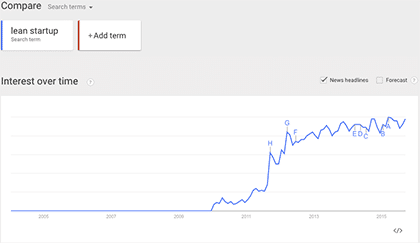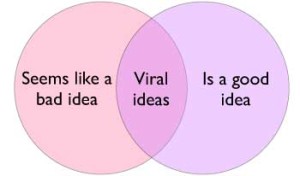 I was at an event in San Francisco last night put on by VentureBeat, and one of the panelists made a comment that I feel compels a response. Hiten Shah, one of the co-founders of Crazy Egg, KissMetrics and QuickSprout, and a very smart guy, said that he thought the term Agile Marketing would go away, because, he argued, all marketing would be agile. Market Darwinism will simply eliminate marketers who aren’t agile, and so we will just say Marketing, rather than Agile Marketing.
I was at an event in San Francisco last night put on by VentureBeat, and one of the panelists made a comment that I feel compels a response. Hiten Shah, one of the co-founders of Crazy Egg, KissMetrics and QuickSprout, and a very smart guy, said that he thought the term Agile Marketing would go away, because, he argued, all marketing would be agile. Market Darwinism will simply eliminate marketers who aren’t agile, and so we will just say Marketing, rather than Agile Marketing.
This is a very smart approach to take at a panel, as it immediately raises the hackles of some of us who’ve invested a lot of time and energy in Agile Marketing, and every audience likes a good fight. I suspect Hiten knows this, although he makes a valid point. If all marketing is agile, do we need to use the term? I think we do, particularly at this stage of its adoption curve, and I also think Agile Marketing is here to stay, just as Agile Software development is here to stay.
Google Trends
Google Trends is one of my favorite tools. It can tell you about the rise and fall of a search term over time, which in many ways is a good proxy for the mindshare or the popularity of a term. I’ve used it to research hundreds of terms over the years. You can also compare the popularity of multiple terms.
Here is what Google Trends says about the rise of the term Agile Software Development, and how it compares to the term Waterfall Model, the model that it supplanted. As you can see, Agile Software Development continues to grow, although much more slowly than it (apparently0 did in the years immediately after the Agile Manifesto was signed in 2001. Unfortunately, Google Trends data doesn’t go back before 2004, so we can just see the tail end of that rapid growth. And the term Waterfall model continues to decline, although slowly.

The surprise comes when you put in the term Software Development. By Hiten’s logic, since almost everyone is now practicing Agile software development, we should start assuming the term. Apparently, we don’t.
Hiten also claimed that the term lean startup had peaked and started to decline, and that Growth Hacking has plateaued. Here is the chart for Lean Startup, followed by the chart for Growth Hacking.
OK, I can see the argument that Lean Startup has plateaued, but I don’t see it declining, and growth hacking continues to show robust growth. In both cases, there are some important concepts that continue to have tremendous impact on how entrepreneurs grow startups.
Agile Marketing
What about the term Agile Marketing? How is it trending according to Google?
There’s growth there, but it’s uneven. I have no idea what happened in July of 2011 that searches for the term spiked, but my guess is that for the remainder of 2011 and into early 2012, there weren’t enough searches for Google to track on Google trends. Since then, the growth has been generally up, but it’s been anything but steady, even declining a bit from April to August of this year. However, in September, which isn’t over yet, searches popped up again. And I can say from the experience of my own blog, traffic in the past 30 days is up 39% compared to the previous 30 day period.
Why Agile Marketing?
Beyond the trends in searches and blog traffic, I think there are two key reasons why Agile Marketing, both the term and the practice, are here to stay.
The first reason is the pace of change. Each year, Google changes its search algorithm 500-600 times. Although most of these are minor, some of them are major, and can greatly impact traffic at any site that’s dependent on organic search. The impact of all of the various social media channels, the impact of marketing technology, the 24 hour news cycle. The fragmentation of markets.
None of this is going to change, and marketers need some way to control this firehose. Whether your answer is Scrum or Kanban or simply a group version of Getting Things Done, marketers need some central way to receive all the requests for work, prioritize them, and get them done in a timely fashion.
The second reason is our increasingly improved ability to measure the impact of marketing, and to iterate and experiment until we get it right. Marketing is no longer solely the provence of the Don Draper/Draper Daniels creative genius who launched a big campaign, and it either worked or it flopped. Today, in addition to creatives (which we’ll always need), we also have data scientists who can tell us which version worked and which didn’t. Marketing has to change in response to this – it has to become more iterative, more experimental and more data driven. Call this growth hacking, data driven marketing or agile marketing, but it’s here to stay.
What do you think?








I tried to apply Agile approach to my Marketing team work back in 2008. At that time you could fit the search results for “agile marketing” to one page, literally. I agree that Agile Marketing is here to stay, although not everything can be transformed as such.
Thanks for the comment, Julia. Yeah, 2008 was way early.
Hi Jim.
Agile Marketing is a great word! I started using it about 5 years ago after implementing agile in our software development in my company. The word agile is now getting a bit over-used but that’s life. People do understand the meaning of agile well from software development. I use it frequently to describe both marketing and sales. It easily explains to clients how we need to include processes in our marketing and sales to measure, collaborate, adapt and iterate. Flexibility is the key. I explain to my clients that their one year marketing plan is out of date the day it’s written.
Our agile plans are like a foundation that supports marketing strategies that can change weekly, if not daily. You still need some basic structure in place for direction, timing and budgeting. You also need a set-up of good marketing assets that convert and tools for tracking and implementation. The agile plan becomes your baseline as you build in flexible campaigns based on immediate feedback across your touchpoints. I sometimes call it a “living plan” to get across the idea that it grows and improves.
It’s tough to keep up all the latest innovations but the basis of our marketing and sales strategies remain the same. Agile is here for a while. It gives us a way to manage campaigns in a rapidly changing world. It allows for some wee bit of order in the chaos.
I hope you will keep up your insightful posts to keep our marketing community agile!
~Susan
Great comments Susan, and thanks for the encouragement!
Hello… I am a professor at CMU – SV and I teach a class called Agile Marketing. I recently spoke at the SV American Marketing Assoc. I share your philosophy on agile marketing (I also teach Agile Development). To me it is like saying Inventory Management will never disappear or be replaced by Supply Chain Control. It is ignoring the fundamental changes in not only the practices but the structures and roles/responsibilities. Also, other departments will have to change as we move to the philosophies behind the agile thinking. I structured a model of the agile software manifesto with the agile marketing manifesto to illustrate the point. If you software group can deliver new product capability on a monthly basis what good is marketing in its current state when it takes 6 months for a campaign effort? Sometimes changing the name changes frozen thinking. We have moved from inventory to inventory management to supply chain management to…. With the technology and new processes we have the ability to think of new ways to more effectively deliver our functions… regardless of the names.
Thanks, Sheryl. Glad to hear you’re teaching Agile to students. I taught marketing at UW for a while, and taught a little Agile, although that wasn’t the focus. I was teaching a class in E-Marketing (the school’s title, not mine), and I had a lot of fun doing it.
It is interesting when Agile Marketing started to catch on. It made me want to look up when I first connected marketing with agile. Starting in the fall of 2010 until April 2011 I was using an agile approach as a Marketing Director for a nonprofit that was developing a web application using Agile Development. The marketing plan I had written for the application ahead of it’s launch didn’t make sense as the application changed during roll out. I started a twitter feed called AgileT December 2010. However, I didn’t start using it regularly as part of my business until the Summer of 2013.
Great article Jim! I completely agree that this term needs to stick around for the foreseeable future, and that it actually needs to be used more by people like you to counteract the proliferation of its misuse.
Far too many people are writing about “agile marketing” when what they really mean is “unplanned marketing.” We need to make sure we’re helping marketers make smart choices about how to structure their days and their departments so they can reap the rewards agile has to offer.
Keep fighting the good fight!
Great stuff you’ve pointed out here Jim. Thank you. I was particularly interested in “marketers need some central way to receive all the requests for work, prioritize them, and get them done in a timely fashion.” This actually inspired me to write a Use Case about how marketers can benefit from using project management tools such as https://yanado.com/
I’m looking forward to publishing it soon.